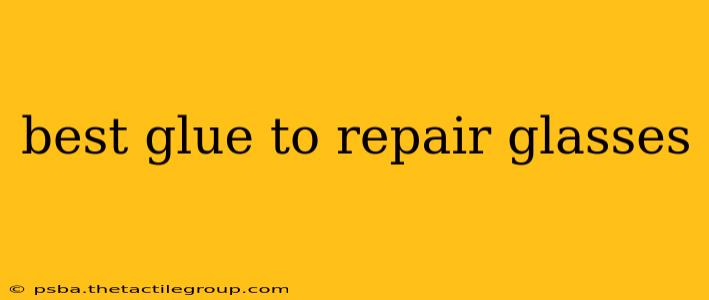Repairing broken glasses can be a frustrating experience, but with the right adhesive, you can often restore them to functionality. Choosing the wrong glue, however, can lead to further damage or a less-than-perfect repair. This guide explores the best glues for repairing glasses, considering various materials and the specific needs of eyewear repair.
Understanding the Challenges of Glasses Repair
Before diving into specific glues, it's crucial to understand the challenges involved in repairing glasses. Glasses frames are often made from delicate materials like acetate, metal (including titanium and stainless steel), and plastic. The lenses themselves can be made of glass or various types of plastic, each requiring a different approach. The glue must be:
- Strong: Able to withstand the stresses of daily wear, including bending and impacts.
- Transparent: To minimize visibility of the repair, especially on clear frames or near lenses.
- Flexible: To accommodate the movement and flex of the frame without cracking or becoming brittle.
- Fast-Drying: For quicker repair time and reduced handling time while the glue sets.
- Resistant to chemicals and UV light: To ensure longevity and prevent yellowing or degradation.
Top Glues for Repairing Different Glasses Materials
Several glues excel in different areas, making the "best" glue dependent on the specific material you're working with:
1. Cyanoacrylate (Super Glue)
Cyanoacrylate, commonly known as super glue, is a popular choice due to its incredibly strong bond and fast-drying time. However, it's crucial to use it sparingly and carefully, as it can be difficult to remove if applied incorrectly. Suitable for: Most plastic frames and some metal frames (use with caution). Not suitable for: Lenses (unless specifically designed for lens repair).
Pros: Strong bond, fast drying. Cons: Can be brittle, difficult to remove if mistakes are made, may not be suitable for all materials.
2. Epoxy Glue
Epoxy glues offer excellent strength and durability, making them ideal for more demanding repairs. Two-part epoxy glues allow for more precise application and longer working time before setting. Suitable for: Metal frames, stronger plastic frames, and some types of lens repairs (check compatibility). Not suitable for: Acetate frames unless a specific acetate-compatible epoxy is used.
Pros: Extremely strong bond, durable, longer working time. Cons: Longer drying time, less transparent than some other options.
3. UV Resin Glue
UV resin glues cure quickly when exposed to ultraviolet (UV) light, offering control over the setting process. This is particularly useful for precision repairs. Suitable for: Many plastic and metal frames, and some lens repairs. Not suitable for: Frames that are sensitive to UV light.
Pros: Quick curing, precise application, good clarity. Cons: Requires a UV light source, may not be as strong as epoxy in some cases.
4. Specialty Eyeglass Repair Kits
Several companies offer specialized kits designed specifically for glasses repair. These kits often include a specialized glue formulated for the unique needs of eyewear, along with additional tools to aid in the repair process. These are often the best option for inexperienced users.
Pros: Designed specifically for glasses, often include helpful tools, may contain materials for a variety of frame materials. Cons: Can be more expensive than buying individual glues.
Tips for a Successful Glasses Repair
Regardless of the glue you choose, follow these tips for the best results:
- Clean the surfaces thoroughly: Remove any dirt, grease, or debris before applying glue.
- Apply a thin layer: Too much glue can weaken the bond and cause clouding.
- Clamp or hold the pieces together: Ensure proper alignment and prevent movement while the glue dries.
- Follow the manufacturer's instructions: Pay close attention to drying times and curing procedures.
- Consider professional repair: For intricate repairs or valuable glasses, it's always best to consult a professional optician.
This information should assist you in selecting the appropriate glue for your glasses repair needs. Remember that attempting repairs yourself carries inherent risks, and professional repair is often the safest and most reliable option, especially for complex damage or valuable eyewear.

